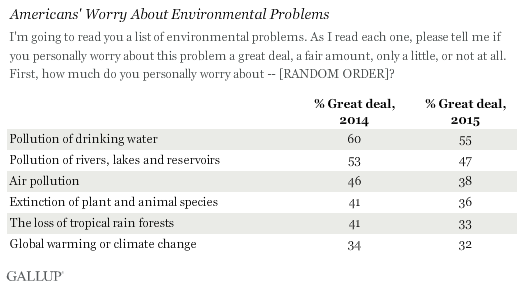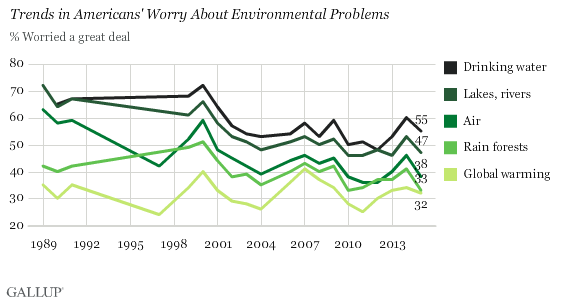Linking to a new Gallup poll that shows Americans in 2015 are generally less concerned about environmental issues. Some issues like air pollution and tropical deforestation took a particularly deep dive, with 8 point declines.

Difficult to reach sweeping conclusions regarding what is going on behind these numbers. But the public’s concerns have reached historic lows. Could it be that the environment is actually cleaner and therefore the public is rightfully less concerned? Or maybe, just maybe there is something else going on here.

One number that is particularly troubling is Climate Change, which is the least worrisome issue among all environmental problems. How could this possibly be given all the media focus on the subject? Those who really worry about anthropogenic global warming (AGW) would argue that it is the main stream media who has given voice to climate deniers and skeptics who is to blame for the public’s growing apathy. Just read David Griffin’s coverage of the coverage, Is the U.S. Mainstream Media’s Climate Coverage Criminal? And just last week, Al Gore fingered the media and continued to threaten those who disagree with him should “pay a price.”
Lindsey Graham, Republican Senator from South Carolina, has acknowledged his own concerns about AGW. Just this week, Graham noted during a speech, “I said that it’s real, that man has contributed to it in a substantial way . . . but the problem is Al Gore’s turned this thing into religion. You know, climate change is not a religious problem for me, it’s an economic, it is an environmental problem.”
Graham is right. Gore and his ilk are largely too blame. Notwithstanding the flawed models and predictions, Gore and climate alarmists continue to pound the climate drums. Not surprisingly, this relentless drumming has had the opposite effect, and has done a grave disservice to science and the public discourse on a very complicated environmental problem. Reading through comments to the Gallup poll, I detected a recurring theme – the erosion of credibility of climate science and prominent voices articulating their concerns. Here’s a comment by Rally2xs that about sums it up:
If the global warming weren’t found to be lying their asses off at every turn, they might have better credibility. They say polar bears are endangered, and then we find that there’s more polar bears than there ever has been. They say that temperature is going up, and then we find that even the gov’t has been altering historical temperature data to reflect a rise in temperature where there was either none or not as much as they’d have us believe. They tout a “hockey stick” model of global warming disaster, and get it debunked. They get caught colluding about how to make their data more scary in e-mail dumps of a university server. Lies, lies, lies, and more lies. No wonder nobody believes them.
Public perception matters in moving the political needle toward a national response. And the needle isn’t going to move if the public is apathetic, or worse, sees the dialogue as built on lies and damn lies. Those who aren’t concerned can be lumped into three distinct groups. Those who think AGW is nothing but a hoax, those who believe AGW is occurring but don’t see the urgency to act because it won’t impact them (an inter-generational problem), and all others who are very confused by the “noise” about what to think, and therefore don’t. No doubt Rush Limbaugh, Sean Hannity, and the WSJ have adversely influenced the opinion of many into thinking AGW is all a hoax built on lies. And sadly, they are partly right. Toward this end, Gore and climate alarmists share the greater culpability in the public’s apathy by creating a house of cards, which is now crumbling at a time when the public should be acting to forge measured and thoughtful policies to a credible and growing environmental threat.
Credibility matters and once it’s gone, it takes a long time to regain, if it can be regained at all. As I continue to yell from my mountain top, we need new voices, credible voices that can help change the dialogue. A dialogue that acknowledges what we know and don’t know, deals honestly with the gaps in our scientific understanding, explains in non-emotional ways the risks and uncertainties of inaction, and lays out the economic arguments for various policy solutions. The AGW debate can only be won with good science and credible voices. Maybe then the public will tune back in and care about the issue.

